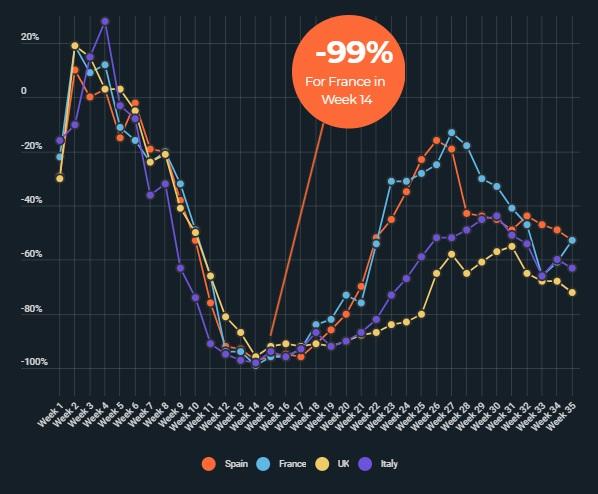It’s no secret that the capacity utilisation of airlines, hotels and recreational outlets has been greatly diminished by the COVID pandemic, but recent data provided by Stockapps illustrates just how much of a hit European tourism has taken in 2020.
According to Stockapps Researcher, Rex Pascual: “As countries shut their borders to protect their citizens from the pandemic, global tourism virtually stopped. This was very apparent in Europe’s leading tourist destinations which were also one of the countries hardest hit by the pandemic.”
During March, COVID pandemic panic was in full force, and saw UK tourism fall by 96%. Meanwhile, Italian tourism dropped by 98%, and summer holiday hotspot, Spain, saw tourism collapse to just 3% of volumes seen last year.

On the worst-hit of the European countries, Pascual added: “The global tourism industry is one of the hardest hit industries with regards to the effect of the COVID-19 pandemic. According to data presented by Stockapps.com, at the height of the lockdowns in Europe, France experienced a 99% decrease in reservations on popular accommodations sites; Airbnb, Expedia and Booking.com compared to 2019.”
The research also indicated that even a summer spree was not enough to offset most of the damage done by the virus, with restrictions painting a rather bleak image of what the ‘new normal’ might look like for travel and tourism sectors.
On the one hand, French and Spanish tourism did recover to just 13% and 16% below their normal levels in June. However, Italy lagged behind, with its peak in August still 44% below normal levels, and UK tourism experienced the most modest recovery, with its high in August still 55% short of normality.
We might imagine that these statistics are downbeat but hardly surprising given the year we’ve all had. What we should be worried about, though, are the volatile developing markets which are highly dependent on consumer demand, both from Western tourists, and for goods.
As stated by Oxford Professor, Sunetra Gupta: “[…] my primary reason for being vocal has all along been my deep concern about the economically vulnerable, in this country and globally. I am terrified when I read reports of 260 million people going under the poverty line as a result of [lockdowns].”
“We must consider all the consequences. I think we also need to take a more holistic view and not just this individual, nationalistic view. Think globally, think internationally.”
Worth a thought, nonetheless. Lockdown may save our loved ones’ lives – but through loss of commerce, it may also cost others theirs.

